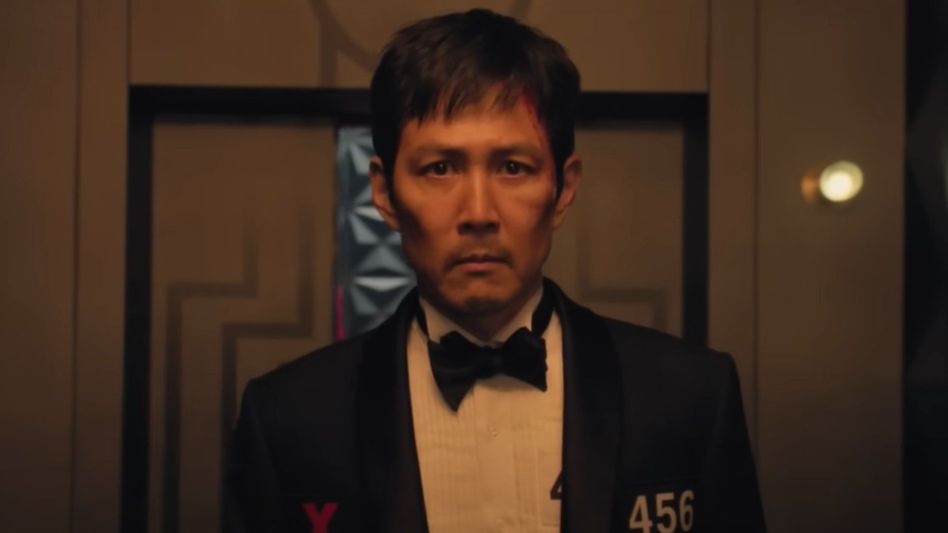Squid Game Season 3 Review: The revolution ends with a whimper
So, does Squid Game Season 3 stick the landing? Maybe not in the clean, triumphant way we crave — but that’s the point. It leaves us gutted, angry, and hollow, staring into the neon-lit void of a system that survives no matter who dies inside it. And in that way, it's the most honest ending we could've gotten.
 Screenshot from trailer
Screenshot from trailerBack in 2021, Squid Game didn't just break the internet, it shattered it into a million pink-jumpsuit-wearing pieces. When the majority of the world's population had never touched a K-drama with a ten-foot pole, this South Korean survival thriller became the most-watched series on Netflix. It wasn't just a breakthrough for the Korean entertainment industry; it was a cultural earthquake that shifted the entire global streaming landscape.
Three seasons later, and we've reached the end. But does Squid Game Season 3 stick the landing, or does it fall flat on its face like a contestant in Red Light, Green Light?
The short answer: It's complicated.
Season 1 gave us Seong Gi-hun's transformation from a gambling deadbeat to a reluctant survivor. Season 2 saw him return voluntarily, determined to end the games from the inside with new allies like cryptocurrency scammer Lee Myung-gi and pregnant Kim Jun-hee. Now, Season 3 picks up after that brutal, failed rebellion, and honestly? Things get dark. Really dark.
Here's the thing about Season 3: it refuses to give us the satisfying conclusion we might have wanted, and that's precisely the point. Gi-hun still can't end the Squid Games. Justice remains frustratingly out of reach. Some are calling it traumatising or disappointing, but that's exactly how real life works: messy, unpredictable, and rarely delivering neat 'Hollywood' endings.
The games this season are absolutely diabolical. The deadly hide-and-seek labyrinth had me holding my breath, while the jump rope bridge sequence is pure nightmare fuel. But it's not just the games that'll mess with your head; it's watching our characters transform in ways that'll make you question everything you thought you knew about heroism.
The emotional sacrifices this season are absolutely brutal. We are talking about characters making impossible choices between their own survival and protecting others, with the weight of those decisions crushing them in real time. Jun-hee's storyline becomes particularly heartbreaking, giving birth during a deadly game only to face impossible maternal choices that'll leave you sobbing. The show doesn't shy away from showing how these situations strip away everything that makes us human, forcing people into corners where there are no good options.
Without spoiling the specifics, let's just say Seon-nyeo's opening prediction about none of the players escaping alive hits very differently by the finale. The emotional toll of watching main characters, people we have invested in across multiple seasons, exit the story earlier than expected is genuinely devastating. The only "winner" ends up being Jun-hee's baby, dubbed Player 222, and there's something deeply unsettling about an infant inheriting blood money. It's the ultimate perversion of innocence, a newborn who represents both hope and the continuation of a fundamentally corrupt system.
Character-wise, the season delivers both triumphs and frustrations. Lee Jung-jae gives his best performance yet as Gi-hun, showing a man pushed to his absolute breaking point; watching him evolve from hopeful revolutionary to someone capable of unthinkable acts is genuinely harrowing. Im Si-wan's Myung-gi transforms from snivelling coward to something far more complex, especially when personal stakes get involved. Park Gyu-young's No-eul gets the most satisfying arc, literally burning the system down from the inside while fighting for her own survival.
But here's where the season stumbles: several major characters feel criminally underutilised or dispatched too early. Cho Hyun-ju, who was positioned as a key player, gets killed off surprisingly early in ways that feel more shocking than meaningful.
And let's talk about Detective Hwang Jun-ho—remember him? The guy who spent Season 1 infiltrating the games and Season 2 building a team to take them down? Well, prepare to be disappointed. His entire police operation turns out to be essentially useless. Again. All that buildup, all those resources, all that hope for outside intervention, and it amounts to absolutely zero impact on the games themselves. It's almost insulting how sidelined the law enforcement angle becomes.
And don't get me started on those VIPs. Their painfully animated, unnecessary accents make every scene feel like a parody rather than the menacing presence they should be. It's like watching cartoon villains crash a psychological thriller.
The season's boldest choice? Having Gi-hun realise that sometimes the only way to win is not to play, a decision that'll leave you questioning what victory even means in a rigged system. Meanwhile, Cate Blanchett's cameo as an American recruiter hints at global expansion, though seeing her play ddakji in LA instead of poker feels like a missed opportunity for cultural specificity.
But here's perhaps the season's biggest misstep: the Front Man practically vanishes. After being such a menacing presence in previous season, Lee Byung-hun's masked villain becomes a glorified background character. For a series that built up this cat-and-mouse dynamic between him and his detective brother, his near-absence feels like a massive waste of talent and storyline potential. When he does finally appear in meaningful scenes, it's almost jarring because you've forgotten he was supposed to be a major player.
The real gut punch comes in the aftermath. Six months later, we see some characters finding peace, others still searching, and the games? They continue. Because, of course, they do. The system is too big, too profitable, too entrenched to be destroyed by individual heroism, no matter how noble.
Is it disappointing that our heroes don't save the day? Absolutely. Is it realistic? Tragically, yes. The real world is full of systems that churn through human lives while the powerful watch from their golden towers. Sometimes the best you can do is save one baby and hope someone else picks up the fight.
Rating: 8/10
Copyright©2025 Living Media India Limited. For reprint rights: Syndications Today








